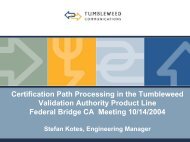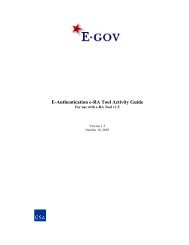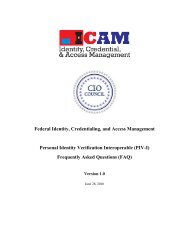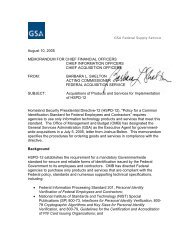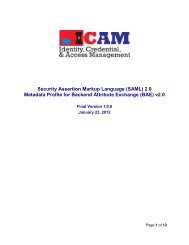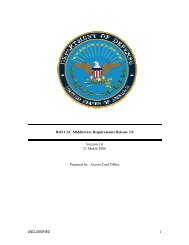CAC/PKI TRAINING GUIDE - IDManagement.gov
CAC/PKI TRAINING GUIDE - IDManagement.gov
CAC/PKI TRAINING GUIDE - IDManagement.gov
You also want an ePaper? Increase the reach of your titles
YUMPU automatically turns print PDFs into web optimized ePapers that Google loves.
3.2 What are Certificates?<br />
8<br />
Product Manager<br />
Secure Electronic Transactions – Devices<br />
A certificate is a computer-generated digital record that ties a user’s identity with the user’s<br />
public key in a trusted bond. This trust is based on the individual’s/entity’s identity being<br />
verified then registered by the RA, and the certificates being created, signed, and issued by a<br />
trusted server known as the CA. As long as the trusted CA signs a certificate and the trusted<br />
CA’s signature can be verified, any tampering with the certificate can easily be detected.<br />
Three types of servers support the DoD <strong>PKI</strong>:<br />
• The DoD Root CA server authorizes subordinate CA servers to issue certificates<br />
to users in the DoD <strong>PKI</strong>. The DoD Root CA is the common point of trust for all<br />
certificates issued by the DoD <strong>PKI</strong>.<br />
• A CA creates, signs, and issues public key certificates to individuals/entities at the<br />
request of a RA. It posts certificate information to the Directory Server, maintains<br />
the CRL, and posts CRLs to the Directory Server.<br />
• A Directory Server stores the certificates containing public keys for all registered<br />
individuals/entities and makes these available to other individuals/ entities that<br />
need to verify a certificate or use a public key for encryption.<br />
Public and private keys help ensure that the information transmitted between computers is<br />
secure. Having the keys themselves are of no benefit, the user must have a PK-enabled<br />
application to make use of them. This provides:<br />
• Confidentiality or privacy: protecting data from anyone who is not authorized to<br />
review it.<br />
• Integrity: protecting data from unauthorized modification during transmission,<br />
storage, and processing.<br />
• Identification and authentication: verifies that you are who you say you are.<br />
• Non-repudiation: Because of the authentication, <strong>PKI</strong> prevents the e-mail sender<br />
from denying he or she sent the message. This is also the case when any<br />
document is signed with the individual’s digital signature certificate. This is<br />
known as non-repudiation.<br />
It is, therefore, imperative that each individual keeps their private key and the PIN on the <strong>CAC</strong><br />
secure. Do not divulge the PIN to anyone.<br />
When a card is being terminated, RAPIDS will revoke the certificates associated with the <strong>CAC</strong>.<br />
RAPIDS will automatically terminate the identity and digital signature certificates for reasons<br />
such as a lost card or invalid entry. If information on the card changed or the card has a defective<br />
chip, the VO will retain that <strong>CAC</strong> and issue a new one.



